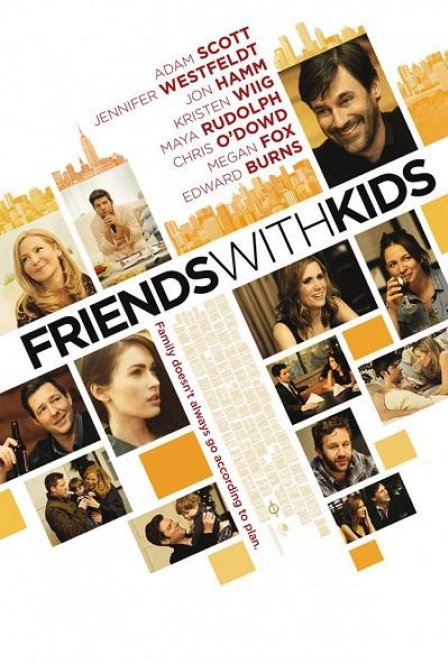Friends with Kids is predicated on the idea that parenthood turns cool people into snippy, harried, miserable monsters. How much you enjoy the film may depend on the extent to which you accept this thesis.
Julie (writer/director/producer Jennifer Westfeldt) and Jason (Adam Scott), old friends who’ve never dated each other, watch aghast as their friends get married, procreate, and stop having lives. This clever duo decides to beat the system by bearing a child together — that way, they can avoid the strains parenthood places on a marriage, because they’re not married or even in love. They agree to split the responsibilities of parenthood 50-50 while remaining free to date other people, effectively compartmentalizing romance and family. The film stacks the deck in their favor by never presenting them with parenting challenges more complicated than deciding who’s going to watch the kid while the other one goes out. Childrearing is reduced to negotiating the logistics of supervision. That is, until predictable romantic-comedy complications intrude: the last third of Friends with Kids finds the leads discovering their long-suppressed feelings in formulaic ways that obliterate the very meager honesty with which the movie approaches its potentially illuminating subject.
Westfeldt’s directorial debut is technically competent, if unimaginative. Her glib screenplay is more of a problem. Some mild attempts at vulgarity can’t disguise the fact that its vision of bright New York professionals is a dilution of Woody Allen (including subway cars that haven’t been seen on MTA tracks since the heyday of Alvy Singer). In spite of the smugness at its core, however, Friends with Kids is mostly amiable and even charming. Westfeldt and Scott are convincing as platonic friends (although he sounds affected calling her “doll”), and they’re surrounded by a capable, high-profile supporting cast of Westfeldt’s real-life acquaintances. Chris O’Dowd scores the most of this purported comedy’s scattered laughs; Edward Burns has a plum role as the film’s most grounded adult character; and Westfeldt’s longtime boyfriend Jon Hamm delivers an interminable, awkwardly written rant that voices the counterpoint argument to Julie and Jason’s experiment. Maya Rudolph and Kristen Wiig, on the other hand, are given little to do.
Westfeldt has shown a fondness for social-experiment concepts in the previous vehicles she’s scripted for herself, Kissing Jessica Stein (woman frustrated with dating douchebags turns to other women) and Ira & Abby (woman proposes to man she’s just met, they give marriage a go). In execution, at least, Friends with Kids may be the most pat and groundless of these conceits. There’s nothing wrong with prioritizing sex, career, etc. over having children, but it isn’t a morally or philosophically superior choice. The fact that parenthood can adversely affect people’s social and sex lives, sleep schedules, tempers, and fashion sense is common knowledge. It’s also common knowledge that there’s much more to it than that, and that having kids affects people differently. This blinkered film acknowledges these facts only by retreating into clichés even more evasive than its dubious premise.

